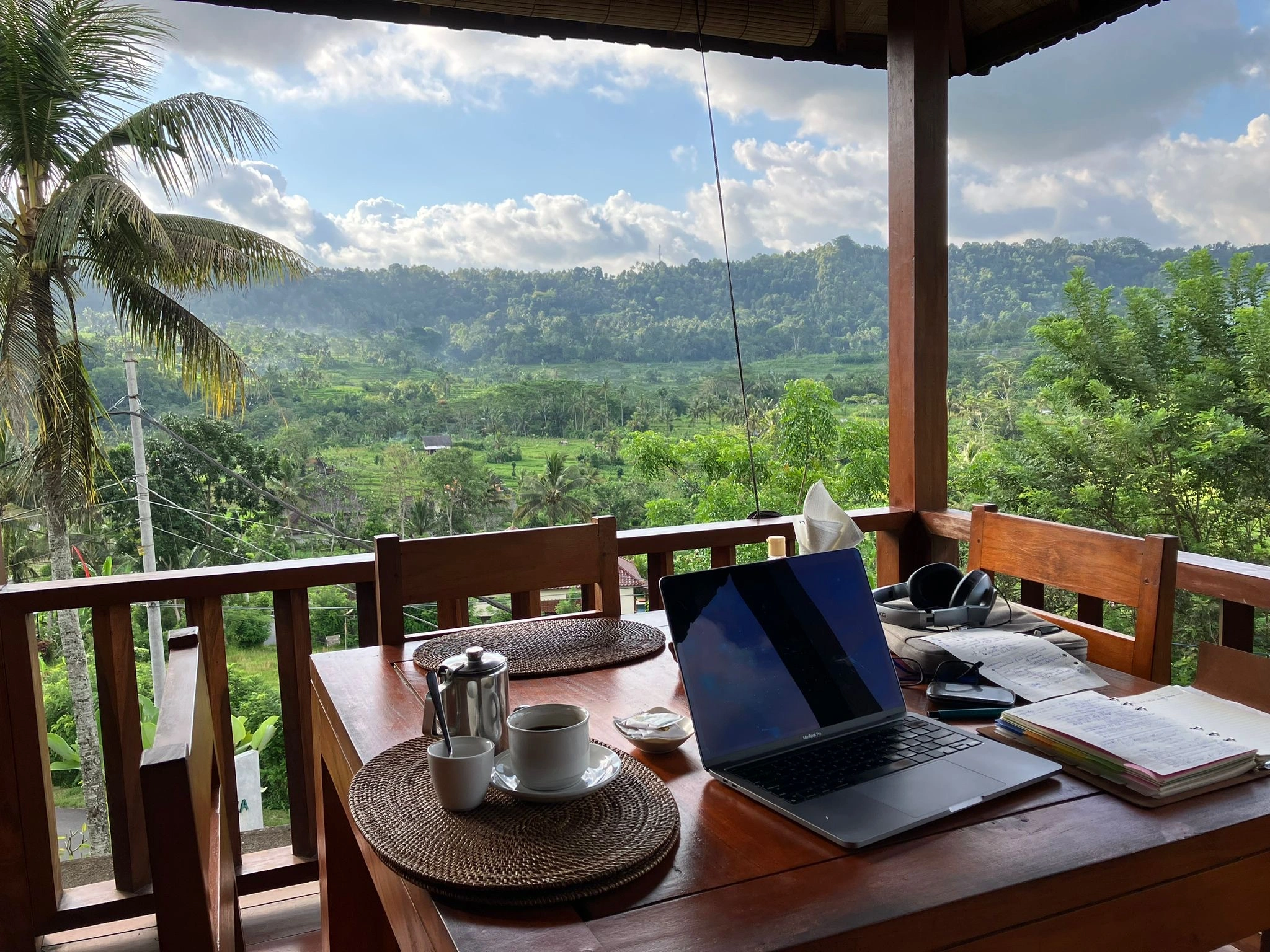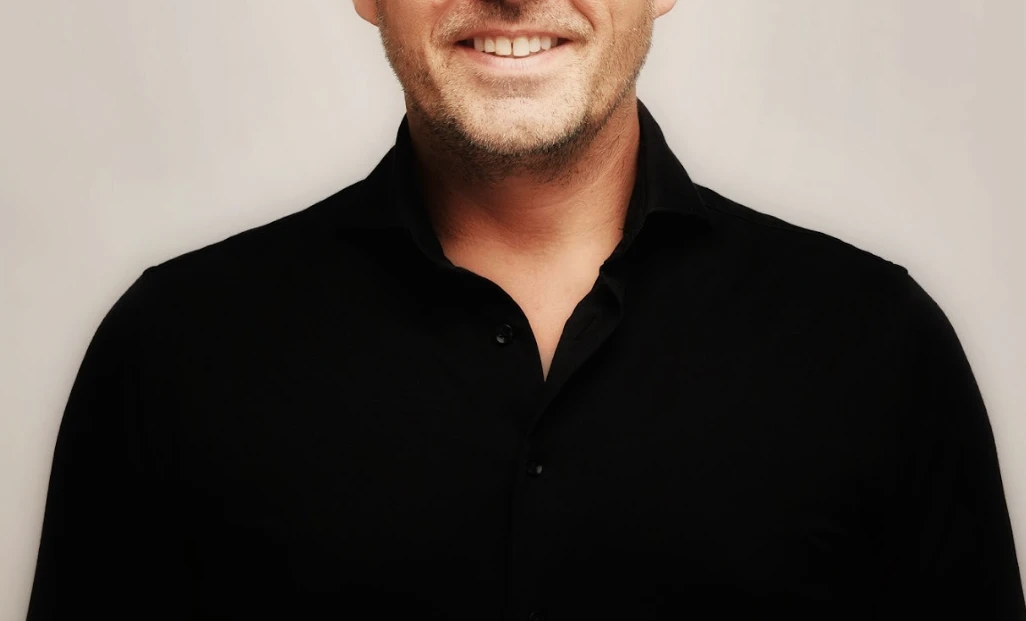From a 9-to-5 office job to a location-independent career. Here’s how Erwin found his place in the sun.
Erwin discovered his piece of paradise on the tropical island of Bali and works as a technical writer for INSTRKTIV.
We asked him what motivated his adventurous move to a new country 12.000km from home, what a typical working day looks like for him, and how he experiences life on the Island of the Gods.
Why did you decide to move to Bali?
My Indonesian wife wanted to move back to her home country after having lived in Europe for many years. Naturally, I followed her when she decided to trade Europe for Indonesia in 2019.
I had been working for the same company for 18 years. Shortly before we moved, the company went out of business. The bankruptcy felt like a confirmation that I had made the right decision.
How did you adjust to life in Bali?
It is true when they say that you need a few years to get settled into a new country. The cultural differences, the climate, the food, being without family and friends, and even the traffic took time to get used to.
Driving was a challenge for sure. Traffic is hectic, seems unorganised at first, and requires complete focus and attention. There is no such thing as making a quick trip from A to B in Bali with a car. Driving just 60km takes 3 to 4 hours and leaves you mentally drained, but it is a great experience every time. So for regular trips, it's just much faster to use the motorbike.
Luckily, getting used to the daily rhythm was a lot easier, it happens naturally due to the heat. People here get up earlier and go to sleep earlier than I was used to in Europe, but it makes sense.
What does a typical working day look like for you?
I start my day by checking my emails. On Mondays, I let the team know what’s on my schedule for the week ahead. After that, I start writing or reviewing documents based on clients’ feedback, and I start preparing for meetings with clients.
My days are quite regular, but at the same time diverse, due to the variety of projects that I work on. Imagine working on projects involving heavy machinery and delicate medical equipment at the same time. Each project can be at a different stage as well, so monotony is never an issue.

Erwin's desk and spectacular view
I assume that the tropical climate affects your working day. How do you deal with that?
I divide my working day into sections to maintain productivity despite the high temperatures. For instance, I take a long break in the afternoon when the temperature reaches its peak, which can be up to 30˚C with very high humidity. I also take breaks to walk and feed our dogs. I balance this out by working another few hours in the evening, after dinner.
What are some of the biggest challenges when it comes to technical writing?
For me, that would be when the documentation from a client is written by someone with high-level product knowledge. They might take mental shortcuts or use abbreviations and terminology that a layman is unfamiliar with. In that case, it is my job to make sense of it.
Keep in mind that, when we take on a new project, we are often as unfamiliar with the product as the end-user will be, however, seeing it from the end-user’s perspective actually benefits us.
What is it like to work with clients and team members from all over the world?
It’s fascinating, all these different nationalities and disciplines that create something unique together.
With regard to communication, everyone is expected to be a bit flexible when it comes to online meetings due to different time zones. Most of the communication with clients is via email, with an occasional online meeting, so that doesn’t pose any issues either.
Do you miss the traditional office? Could you return to a 9 to 5 job?
The only things that I miss sometimes are the casual conversations at the coffee machine. I don’t feel lonely though, my colleagues are very supportive and accessible. In addition, we have a large social circle on Bali. Most Balinese are Hindu, they enjoy spending time together, which reflects in the many ceremonies they perform.
People are flexible beings, if something happened and I needed to go back to a 9 to 5 job, I would be able to do it. But I would prefer not to. I’m very satisfied with the way I work now, with my job, and with my colleagues.
What do you like most about working remotely?
I enjoy the freedom to work from anywhere and choose my view. The picture that I shared was taken at a beautiful spot on the northern side of the island, where I had the privilege to work for a few hours. My favourite place to work is at home, though, where I can use a large screen in combination with my laptop. I guess I’m a little less nomadic in that way, I prefer to finish my work first and then go out.
What language do you speak at home?
I speak a little Indonesian, just enough to make myself understood, but having a casual conversation is still a bit difficult. My wife lived in Europe for a long time, so she speaks excellent English. That is why we speak very little Indonesian at home. Since Bali is a tourist island, I can get away with speaking English in a lot of places.
Are you planning on staying on the island?
Probably. I feel at home in Bali and have no regrets about moving here. We will see what the future brings.
Are you ready for a new challenge? INSTRKTIV is always looking for location-independent professionals in the field of technical documentation. Whether you’re based in Amsterdam, Athens, or Adelaide, don’t hesitate to get in touch.

Ferry Vermeulen
Founder of INSTRKTIV and keen to help users become experts in the use of a product, and thus to contribute to a positive user experience. Eager to help organisations to reduce their product liability. Just loves cooking, travel, and music--especially electronic. You can also find him on:
Profile Page, Linkedin, Instagram and Twitter!
You may also be interested in
-
19 April 2024
The Machinery Directive's Guide Allows Digital User Instructions
Today's update to the Guide to the Application of the Machinery Directive introduces a major development: digital user instructions are now allowed, aligning with provisions from the new machinery regulation....
-
19 April 2024
The new machinery regulation and the implications for user manuals
This article gives an overview of all the changes in the new machinery regulation compared to the machinery directive in relation to the user instructions and goes into a bit more detail about digital manuals....

